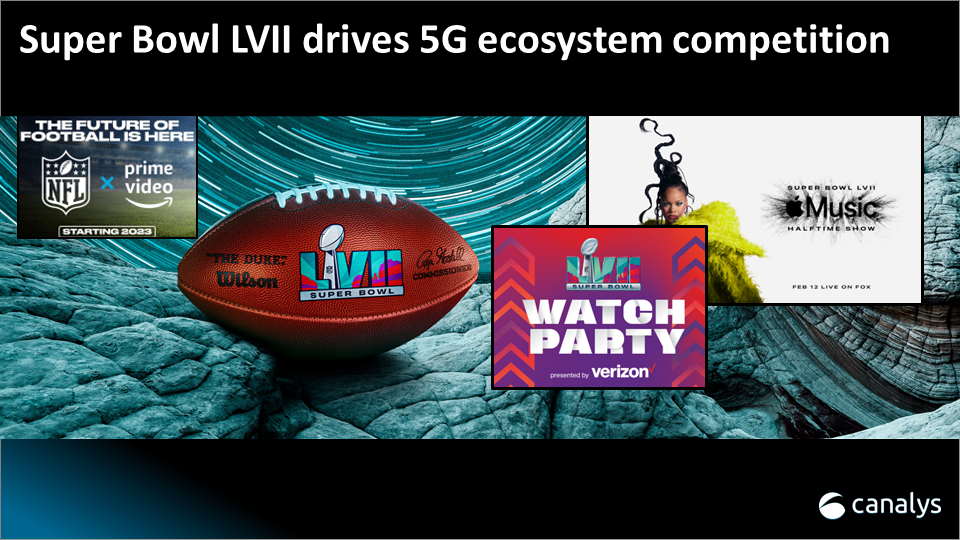Canalys' insight into recovery schedule for PCs in 2023
10 February 2023

Verizon, Apple Music and Amazon signed key sponsorships with the National Football League (NFL) to deliver technological innovation for one of the biggest annual sporting events in the United States (US), the Super Bowl LVII.

Technology companies' increasing spending with the National Football League (NFL), including those high-profile multi-year deals, will continue to define the Super Bowl in years to come, including Super Bowl LVII happening this year in February. Verizon, Apple Music and Amazon signed key sponsorships with the NFL to get their brands in front of consumers and promise to deliver technological innovation for one of the most significant annual sporting events in the US. As the traditional excitement builds around this annual US sporting event, there is an elevated expectation of new tech and telco partners to deliver an optimal experience for fans.
Food, drinks, and technology are critical to a successful Super Bowl Sunday experience. This year's pseudo-holiday in the US is likely to return to pre-pandemic levels, which will come close to the latest record consumer spending for the Super Bowl in February 2020 at approximately US$17 billion. Competition between telcos in terms of investments in infrastructure upgrades for the event has been heating up over the years across fiber, wireless networks and WiFi. Since last year, telco's infrastructure race to provide the "ultimate" 5G experience has been largely accelerated. For this year's event, Verizon, the event's "official 5G partner", has made a US$107 million upgrade to deploy thousands of 5G antennas and nodes in the stadium and the district area. AT&T and T-Mobile US, despite not officially sponsoring the event, announced some significant upgrades to their networks to support the "Big Game". More importantly, some of the upgrades of 5G networks are permanent in the areas, which means significant network improvements for the end-users and businesses in the area. The result of such investments will be tested this Sunday in the quality of streaming services, creation of premium media content and delivery, and overall quality of access by fans to the network while in the stadium or streaming the highly anticipated half-time show at viewing parties hosted by local venues and at home. To tech companies, it is a significant opportunity to showcase innovations and marketing products, services or subscription value. The performativity of network and service capabilities at events in highly dense cities, no doubt, is a moment to win (or lose) brand loyalty among customers.
According to Canalys, 73% of smartphones were sold through carrier channels in the first nine months of 2022. Despite carriers' channel share dropping from the pre-pandemic level of 87% in 2019, carriers are recovering from 2020 and 2021 as the market reopens and carriers' 5G infrastructure end experience improves. The event's magnitude is a unique opportunity to gather critical insights into the 5G capabilities of devices operating on carrier networks. It gives device, OTT service and network companies to identify barriers faced by the 5G ecosystem, with so many spectators using devices and services to facilitate their experience. Big telcos and big tech have much to gain from such events to best strategize investment priority, products, and services in a volatile market, as do other vendors and OEMs keep an eye on corporate giants and their respective strategies for 2023 and beyond.